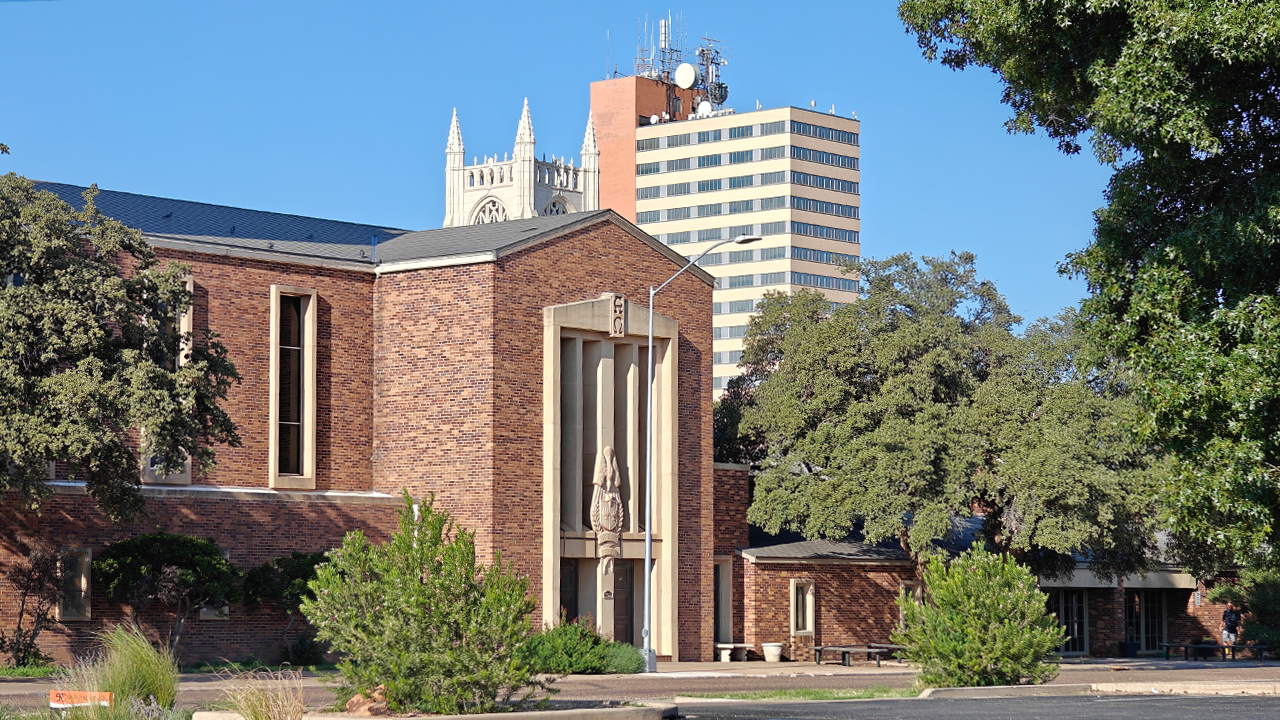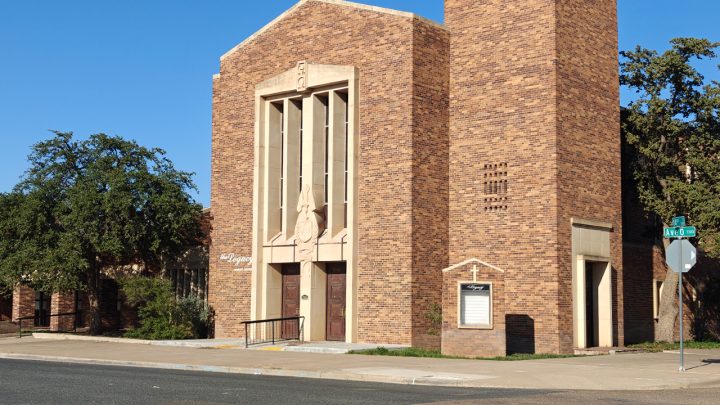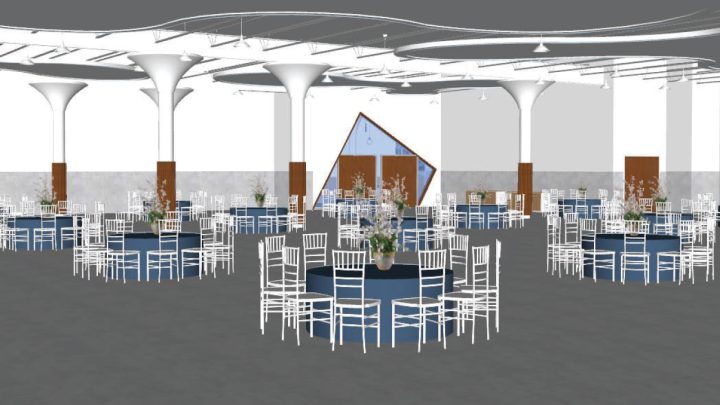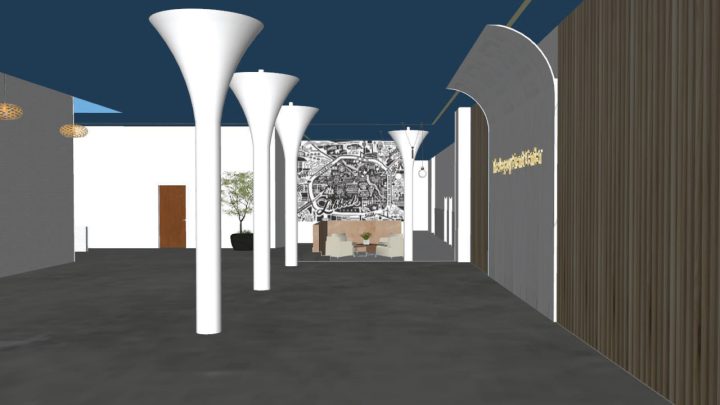Legacy Event Center in Lubbock
A grant program paying $4.5 million since 2016 to aid downtown renovation should not exist, argues Lubbock City Councilman David Glasheen.
It came to light Tuesday when the Council agreed to pay $125,000 to help the YWCA with a $7 million downtown renovation project. These grants have been routine for years.
The YWCA grant would go toward exterior and interior work on the former First Presbyterian Church building at 1500 14th Street – now called the Legacy Event Center.
Glasheen voiced objections – not because he thinks YWCA should be denied the money. He thinks everyone should be denied this money.
“The government should not take property taxes from homeowners and small businesses to redistribute it to government favorites,” Glasheen said.
In some cases, Glasheen said, the government takes money from one business just to give it to a competitor. He called it an “unfair special interest.”
Façade & permittable grants
The city offers two grants through a program at Market Lubbock Inc. One subsidizes work on the façade or outside of a building (including parking lots). Up to 50 percent of the cost can be reimbursed.
The other is called a permittable grant for interior work, with limitations. Up to 10 percent of the cost can be reimbursed. It’s called permittable because these projects are big enough to require building permits.
The 171 grants have totaled more than $4.5 million. The average grant is more than $26,000, and it’s been tied to more than $103.5 million of private investment downtown.
The yearly budget and grant payments at Market Lubbock must be approved by the City Council.
The project
Technically the YWCA got two grants – one for $25,000 and the other for $100,000. The Council approved the first one on a 5-2 vote, the other on a 4-3 vote.
YWCA director Glenda Mathis said the YWCA is giving something of value to the community.
“Our proposal is to take an existing building that’s not being used and revitalize it into an event space. Anyone who’s tried to book an event knows that there’s very little space available in the Lubbock community at all, much less in the downtown area for any kind of big event,” Mathis said.
“We have completely demolished the inside, other than the sanctuary. We kept that as it is – just primarily for the historic value of it. And so, all of the lower level has been made open so that it could serve as convention or meeting space,” Mathis told the Council.
The 24,755 square-foot interior demolition was done earlier this year according to public records.
“The reason we went through the demolition was because it’s an old building,” Mathis said to the Council. “All of that has been done and it’s ready for construction,” Mathis said.
She did not disclose how much of the money has been raised for the project and there is no timetable yet.
If the grant money had been denied, the project would have still gone forward “ … because we believe in it,” Mathis said.
Glasheen’s objection
The YWCA grant request came up just minutes before the Council voted on a property tax increase.
“The voters are hungry for a change. It’s time to lower taxes. It’s time to put families and small businesses above special interest groups,” Glasheen told his fellow councilmembers.
If anyone wants to renovate a downtown building, fine, he said. But spend your own money.
“Keep your hands off the wallet of Lubbock homeowners and Lubbock businesses,” Glasheen told the Council.
He later told LubbockLights.com, “Some people have argued that these special interest grants help because they will improve property tax values on the renovated property, and then we recapture that in tax revenue.”
“Mathematically, it doesn’t work,” Glasheen said.
And it’s even less persuasive when the money goes to a non-profit which does not pay a property tax.
“Part of the American Dream is being able to work hard and benefit from the reward of your own hard work. These special interest grant programs destroy the promise of the American Dream because they take money from competing businesses and directly give it to competitors,” Glasheen said.
No evidence was given to the Council the grants work, he said.
“We’ve seen in the United States and across the world that government handouts don’t improve the lives of people. What improves people is education, public safety, good public infrastructure,” Glasheen said.
Mathis’ response
“I love philosophical objections. I think they cause us all to think and to really be mindful of every dollar we spend,” Mathis said.
“Anytime someone raises an objection, I think it’s a really good opportunity for you to look at your project and make sure that your mission and your intentions are valid,” Mathis said.
The event center is valid, she said.
It will support jobs, like caterers, floral designers, and audio/video professionals, she added.
“You’ll have a lot more jobs and that and activities, business activities that will go on in the downtown area as a result of having that kind of a space,” Mathis said. “It is an economic engine.”
The YWCA is a non-profit organization, so no property taxes. But big events would generate sales tax activity. But more importantly, it fills a need and benefits Lubbock as a whole.
Slideshow: Exterior of Legacy Event Center and artist renderings of remodeled interior
Market Lubbock Inc. responds
John Osborne is president and CEO of Market Lubbock Inc. and the Lubbock Economic Development Alliance.
“We’ve been very pleased with the progress of that downtown revitalization,” Osborne told LubbockLights.com.
He mentioned a number of big investments downtown like Western Bank, Simflo, N2 Electric, the DoubleTree Hotel, the Cotton Court, Dirk’s, Two Docs and plenty of others who either built something new or renovated.
The taxable value of the Central Business District in Lubbock went up more than 35 percent from 2016 through 2023, according to numbers Osborne provided.
“The reason we wanted downtown revitalization was because Gen. Y, which is the millennials, and Gen. Z choose where they want to live before they choose where they want to work,” Osborne said.
“We felt like the revitalized downtown was one of the quickest and easiest ways to try to get this younger workforce to remain in our community,” Osborne said.
Other cities, he said, had more complicated programs requiring businesses to submit for a dozen different programs in their efforts to have downtown redevelopment. Lubbock wanted something simpler.
Market Lubbock had a fairly simple grant program. A business could be reimbursed for a portion of work done both outside and inside a building.
For downtown, the city sets aside $750,000 per year. Another $500,000 goes for East Lubbock, a portion of 34th Street and North University Avenue.
Osborne said he has the highest level of respect for the objections raised by Glasheen.
“With all economic development programs, as councils change, priorities change. Our job is to try to evolve with them,” he said.
If the Council wants to try something different, then Osborne will do that.
Response from the Council
A majority of the Council supported both YWCA grants, but Councilmember Jennifer Wilson voted “yes” on one and “no” on the other.
“I love the facade grant program. I think it has brought a tremendous amount of economic stimulus downtown. … I struggle more with giving people money to renovate the inside of a building,” Wilson said.
The interior renovation grants cannot be for furniture or other things that leave if the business relocates. New walls are eligible, but not a new desk.
Councilmember Christy Martinez-Garcia voted “yes” on both and reminded others the work must be done first and the grants get paid second.
“In my view, that would be considered a hand up and not a handout,” Martinez-Garcia.
Mayor Mark McBrayer voted “no” both times.
“This is not about the YWCA. They do great work here. But I just have a philosophical problem with using taxpayer money to enhance the property of a non-taxpaying entity,” McBrayer said.
What comes next
Glasheen thinks there is a desire to make things better.
“I think that the most recent vote on the grants shows that there is an interest from other members of the Council to reevaluate the program criteria and try to improve it,” Glasheen said.
“My idea of improvement would be to abolish it,” Glasheen said.
He does not have the votes for that. But he might have some votes to make changes.
“Making evidence-based decisions is always going to be an improvement over what the Council is doing right now, which is just allocating tax dollars without any evidence,” Glasheen said.
He repeated something the mayor said. This is not about YWCA. It’s about the grants themselves.
“I don’t criticize small businesses for applying for these grants. It’s logical for any business to apply for this grant if they can. I don’t think that the YWCA is an appropriate recipient of tax dollars. But it’s logical that they would apply for this program because it exists,” Glasheen said.
One improvement, he thought, was to remove non-profit properties from eligibility.
“The city doesn’t need to be supporting charitable organizations with property tax dollars,” Glasheen said.
Comment, react or share on our Facebook post.





 Facebook
Facebook